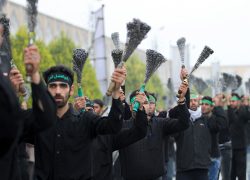The Gazi dialect belonging to the group of Central Plateau Dialects is an ancient Iranian dialect, which has managed to survive in Gaz-e Borkhar—10 km from Isfahan—and is still spoken by the region’s native people.
Historical evidence indicates that this local dialect is over three millennia old and considers it a later form of the Pahlavi language.
The Gazi dialect was common not only in the surrounding regions of Isfahan, but also in the city of Isfahan itself before Safavid times. But, when Isfahan became the capital, Persian gradually replaced this ancient dialect afterwards.
In addition to a sharp and vast difference in lexicon between Gazi and standard Persian, the former has two special vowel sounds, which do not exist in the latter: first, a diphthong that is a combination of /ɔː/ and /e/; second, another one that is a mix of /u:/ and /i:/.
There is abundant evidence of this regional dialect in ancient texts of Persian literature, including four sonnets belonging to Ouhadi Maraghei (or Isfahani) from his diwan (a collection of poems), which were composed in the old language spoken in Isfahan—which is in fact the current Gazi dialect.
Comparing the lexicons of Pahlavi and Gazi, it is obvious that they are related. Furthermore, the grammars of both are similar as well.
While many other dialects in different parts of Iran have no or a limited written form, Gazi enjoys a very old and rich one.
There is also a very valuable poetry collection called the Diwan of Darvish Abbas Jazi, a great poet of the 13th century, in which over 13 thousand verses have been recorded in Gazi.
There are a great number of verbs in Gazi, and they resemble those of the Pahlavi language. Its verb conjugation is also completely unique and different from Persian grammar, and as a matter of fact, it has a complete grammar of its own.
In the city of Gaz, this dialect is spoken as the official and the main language, and up to a range of one hundred km, it is also used in such neighbouring cities as Khorzouq, Khomeini Shahr, Komshecheh, Mohsenabad, Vazvan, Meymeh, Josheqan, Vandadeh, Varzaneh, etc.
Additionally, a similar dialect can be heard in the cities of Zavareh, Ardestan, Khansar, Abouzeidabad and Naein.







